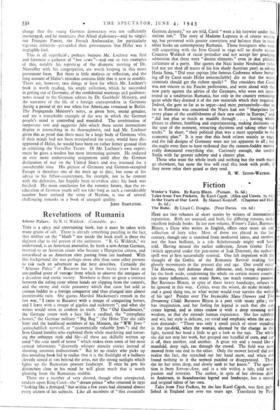Revelations of Rumania
Athene Palace. By R. G. Waldeck. (Constable. 95.)
THIS is a spicy and entertaining book, but it must be taken with many grains of salt. There is already something puzzling in the fact. that neither oil the " blurb " nor inside the book itself is there the slightest clue to the person of the authoress. " R. G. Waldeck," we understand, is an American journalist, by birth a non-Aryan German, married to an Austrian count who became a Hungarian citizen, and naturalised as an American after parting from her husband. With this background she was perhaps more able than some other persons to risk such an adventure as she here describes. Certainly the " Athenee Palais " of Bucarest has in these hectic years been an unequalled point of vantage from which to observe the intrigues of a decadent and exotic society. Nowhere is there so great a Contrast between the ruling caste whose hands are slipping from the controls, and the strong and virile peasantry which that caste hag sold as cannon fodder to a foreign conqueror and thus plunged into almost irretrievable ruin. She quotes Marshal Mackensen's remark in the last war, " I came to Bucarest with a troupe of conquering heroes, and I leave with a troupe of gigolos and racketeers "; and what she writes would seem to confirm its truth. The " Old Excellencies," the Gestapo count with a face like a cardinal, the " cratoplutic . bosses," the German military " Big Bug " (the Hohe Tier she calls him) and the hardfaced members of his Mission, the " WW Jews " 1wirtschaftlich wertvoll, or "economically valuable Jews") and the Iron Guard bandits who exploited them while murdering and tortur- ing the unhappy rank and file—all these are skilfully written up amid " the sour smell of terror " which makes even some of her most cynical informants "discreetly whisper atrocity stories instead of shouting amorous indiscretions." But let no reader who picks up this revealing book fail to realise that it is the flashlight of a bullseye cleverly aimed at rats behind the arras, not the strong sunlight which lights up the Rumanian peasant landscape. If once he gets his distinction clear in his mind he will glean much that is worth gleaning from the Rumanian stubble.
There are a number of very shrewd, though often unexpected, verdicts upon King Carol—the " dream prince " who returned in 1930 " looking like a demigod," but within a few years had alienated almost every section of his subjects. Like all members of " this essentially
German dynasty," we are told, Carol " went a bit haywire under this violent sun." The story of Madame _Lupescu is of course written up, but presented with greater conviction and balance than in most other books on contemporary Rumania. Those foreigners who were still coquetting with the Iron Guard in 1940 will no doubt accuse Countess Waldeck of racial prejudice and not accept her grudging admission that there were " decent elements" even in that pitiable caricature of a party. She quotes the Nazi leader Neubacher (who had not yet shed all traces of his less shady Austrian past) as asking Horia Sima, "Did your capitan [the famous Codreanu whose bump- ing off by Carol made Hitler irreconcilable] die so that the worst criminals should get the richest spoils? " She considers that Carol was not sincere in his Fascist professions, and went ahead with the new party against the advice of the Germans, who were not inter-. tested in a totalitarian Rumania, but only in the country remaining quiet while they drained it of the raw materials which they required. Indeed, she goes so far as to argue—and most persuasively—that so far as Rumania was concerned the Nazis had not " blueprints for every phase of the establishment of their new order in Europe," and " did not plan so much as muddle through . . . , leaving whole phases to chance, fumbling and experimenting, making decisions on the spur of the moment, retracting decisions and taking other bad tracks." In short, " their political plan was a mere appendix to the economic plan." It is true that this book relates mainly to 1940, and the full designs of Germany were not yet apparent to all ; but she ought even then to have reckoned that the cannon-fodder motive really dominated everything else. Curiously enough, she credits Stalin with far greater subtlety and a clearer plan.
Those who want the whole truth and nothing but the truth must go elsewhere, but none the less will read this book with profit, if they never relax their guard as they read.
R. W. SETON-WATSON.


























 Previous page
Previous page